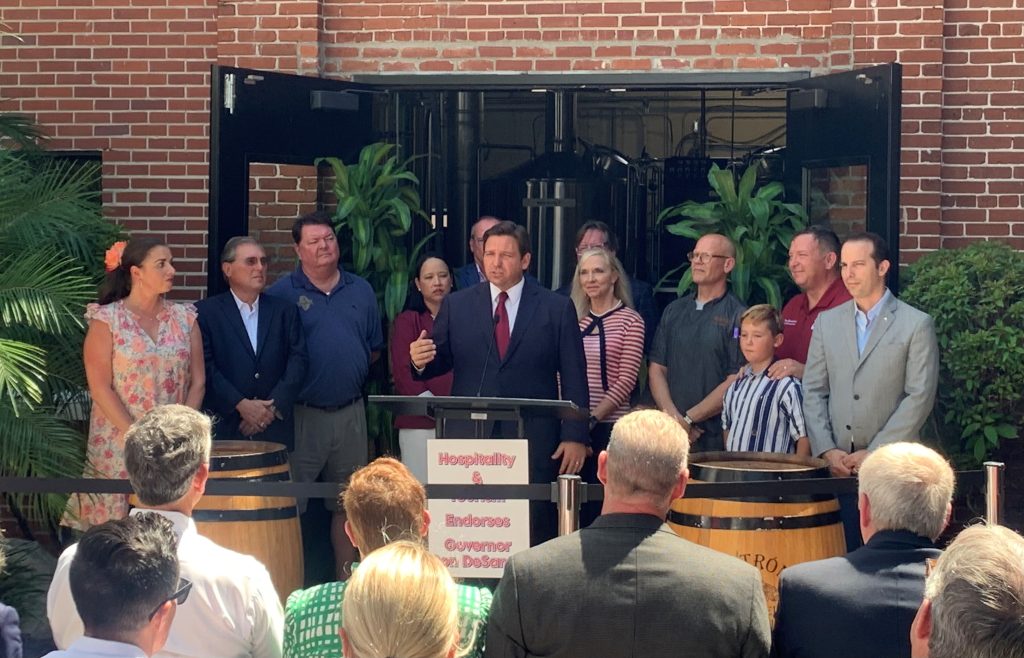Governor Ron DeSantis has expanded the State of Emergency for all 67 Florida Counties and Attorney General Ashley Moody Activates Price Gouging Hotline in Advance of Tropical Storm Ian (formerly Tropical Depression 9)
From the Office of Governor Ron DeSantis
| Governor Ron DeSantis Declares State of Emergency for 24 Counties, Urges Floridians to Prepare for Impacts from Tropical Depression 9
Governor DeSantis has also requested a federal pre-landfall Emergency Declaration TALLAHASSEE, Fla. — Today, Governor Ron DeSantis issued Executive Order 22-218, declaring a State of Emergency for 24 counties in the potential path of Tropical Depression 9. Additionally, Governor DeSantis has requested a federal pre-landfall Emergency Declaration in anticipation of impacts from the storm. This declaration will make available important resources and support, as well as free up funding sources for emergency protective measures. Under this this emergency order, members of the Florida National Guard will be activated and on standby awaiting orders. “Today, I signed an Executive Order issuing a State of Emergency due to the threat of Tropical Depression 9,” said Governor Ron DeSantis. “This storm has the potential to strengthen into a major hurricane and we encourage all Floridians to make their preparations. We are coordinating with all state and local government partners to track potential impacts of this storm.” Tropical Depression 9 has the potential to strengthen and become a major hurricane in the coming days and the Governor is urging Floridians and their families to begin preparing and ensuring their family emergency supply kit is ready and stocked with food, water, and medicine. By declaring a state of emergency, Governor DeSantis is ensuring that state and local governments have ample time, resources and flexibility to prepare. To find resources to help you and your family prepare for this storm, you can visit floridadisaster.org/planprepare. The severity and track of Tropical Depression 9 will continue to evolve. Because of this and the potential for dangerous storm surge, heavy rainfall, strong winds, flash flooding, and the potential for isolated tornadic activity, Governor DeSantis issued the State of Emergency for the following 24 counties:
Follow @FLSERT and @GovRonDeSantis on Twitter for live updates. Visit http://www.floridadisaster.org to find information on emergency preparedness. ### |
From the Office of the Attorney General
TALLAHASSEE, Fla.— Attorney General Ashley Moody today activated Florida’s Price Gouging Hotline with Tropical Depression Nine approaching the state. The activation comes following Governor Ron DeSantis’s state-of-emergency declaration for 24 counties. In areas covered by the state of emergency, Floridians can report instances of severe price increases on essential commodities needed to prepare for the storm. Florida’s price gouging law only applies to commodities and services essential to preparing for, or recovering from, a storm within the areas of a declared state of emergency.
Attorney General Ashley Moody said, “Floridians should prepare now with Tropical Depression Nine moving closer to our state. If anyone suspects price gouging, report it to my office by calling 1(866) 9NO-SCAM, filing online at MyFloridaLegal.com or using our free No Scam reporting app.”
During a storm-related declared state of emergency, state law prohibits excessive increases in the price of essential commodities, such as food, water, hotel rooms, ice, gasoline, lumber, equipment and storm-related services needed as a direct result of the event.
The state of emergency for Tropical Depression Nine is declared for the following counties: Brevard, Broward, Charlotte, Collier, DeSoto, Glades, Hardee, Hendry, Highlands, Hillsborough, Indian River, Lee, Manatee, Martin, Miami-Dade, Monroe, Okeechobee, Osceola, Palm Beach, Pasco, Pinellas, Polk, Sarasota and St. Lucie.
Anyone who suspects price gouging can report it to the Florida Attorney General’s Office by using the No Scam app, visiting MyFloridaLegal.com or calling 1(866) 9NO-SCAM. Attorney General Moody’s No Scam app can be downloaded for free on Apple and Android devices through the app store by searching No Scam.
For tips on reporting price gouging, click here.
For more information on price gouging, click here.
Violators of the price gouging statute are subject to civil penalties of $1,000 per violation and up to a total of $25,000 for multiple violations committed in a single 24-hour period. In addition to the civil penalties for price gouging, state law criminalizes the sale of goods and services to the public without possession of a business tax receipt.
To download Attorney General Moody’s Scams at a Glance: Price Gouging brochure in English, click here. To download the Spanish version, click here.
For tips on what to do before and after a storm strikes, download the 2022 Hurricane Preparedness Guide here. For the Spanish version, click here.
###

